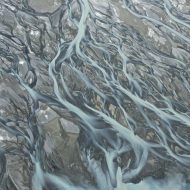By Kavita Upadyay

In the first in-person meeting in the two years since the project began, the Riverine Rights project’s team met in India in April, 2022.
Led by Axel Borchgrevink, the team members from Norway, New Zealand, and India met in New Delhi on April 22 for a two-day workshop organised by Bibhu Prasad Nayak. Titled ‘Rivers in Indian law: Opportunities and challenges for legal rights for rivers in India’, the first day of the workshop focused on locating the rights of rivers within the Indian legal system. The speakers – lawyers working on rivers and the environment across India, and Justice Adarsh Kumar Goel, who is a former Supreme Court judge and chairperson of the National Green Tribunal (NGT) – delved into the opportunities for legal personhood and related challenges in the realm of river rights within Indian law.
The workshop was organised by the Tata Institute of Social Sciences (TISS), Hyderabad (a partner in the Riverine Rights project) in collaboration with the Bar Association of India. The workshop was also an opportunity to share the project’s early research results on the legal rights of the Whanganui River in New Zealand and the Atrato River in Colombia. These were presented by Elizabeth Macpherson and Catalina Vallejo Piedrahita.
April 23 Workshop

During the April 23 workshop, the team held further academic discussions on various aspects of rights of rivers in the Indian context. Speakers in the workshop titled ‘Legal personhood for rivers and environmental governance in India’ included a mix of academics, practitioners, and legal experts who work on water policy, environmental governance, and environmental law. They explored the broader field of the rights of nature, and the challenges that ensue from a rights-based approach in India. During the session, members of the Riverine Rights team also presented their research-based insights. Borchgrevink introduced the project, John Andrew McNeish spoke on the context of the Atrato River, Macpherson and Miriama Cribb spoke on the case of the Whanganui River, and Nayak presented the project’s work on the Ganga and Yamuna Rivers in India.
Workshop in Dehradun

In India, the project aims to reveal and contrast the narratives that surround the debates and discussions over legal personhood of the Ganga and the Yamuna in Uttarakhand – the state where the two rivers originate. With this in mind, on April 25 a workshop was organised by Rahul Ranjan in Dehradun, Uttarakhand, to engage with journalists, researchers, filmmakers, and activists who work on issues pertaining to rivers, especially the Ganga and its tributaries. The discussions demonstrated rivers to be central to Himalayan life. Issues surrounding infrastructure development, including hydropower projects and road construction were demonstrated as giving rise to various forms of contestation and protest. The changing behaviour of the Himalayan rivers due to extreme weather-related events resulting from climate change, and the stories of deaths and disasters from floods in the region were shared with the team. Additionally, the role of religion in the deification of the Ganga was discussed. The workshop ended with the screening of a documentary film ‘Moving Upstream: Ganga’, which deepened the understanding of the issues that were raised in the discussions during the workshop.
April 26 Visit to Devprayag

April 26 marked a visit by the Riverine Rights team to Devprayag – a town in Uttarakhand’s Garhwal region where the Alaknanda and the Bhagirathi rivers meet and form the Ganga. On the same day, the team visited the HNB Garhwal University in Srinagar Garhwal. In a discussion titled ‘Managing natural resources for sustainability: Rivers, forests and mountains in Himalaya’, professors from the departments of geology, environmental sciences, zoology, and forestry and agricultural sciences discussed the challenging geology of the Himalayan region, and the importance of rivers and forests in the region as natural resources that need to be managed and developed sustainably. The Garhwal tour included a visit to Rishikesh – the unofficial yoga capital of the world – through which the Ganga flows. The ashrams and yoga centres in Rishikesh introduced the team to the ideas of spirituality and religion, which are enmeshed with the rights of rivers.
May 2 Workshop

The India visit culminated in a workshop at TISS, Hyderabad, on May 2, which comprised academic deliberations on the theme ‘Exploring nature’s rights in India: Complexities of nature-culture dynamics’. The discussions explored moves to implement the rights of nature and considered its probable impacts on people, including indigenous communities whose livelihoods and traditional belief systems are thoroughly intertwined with nature.
